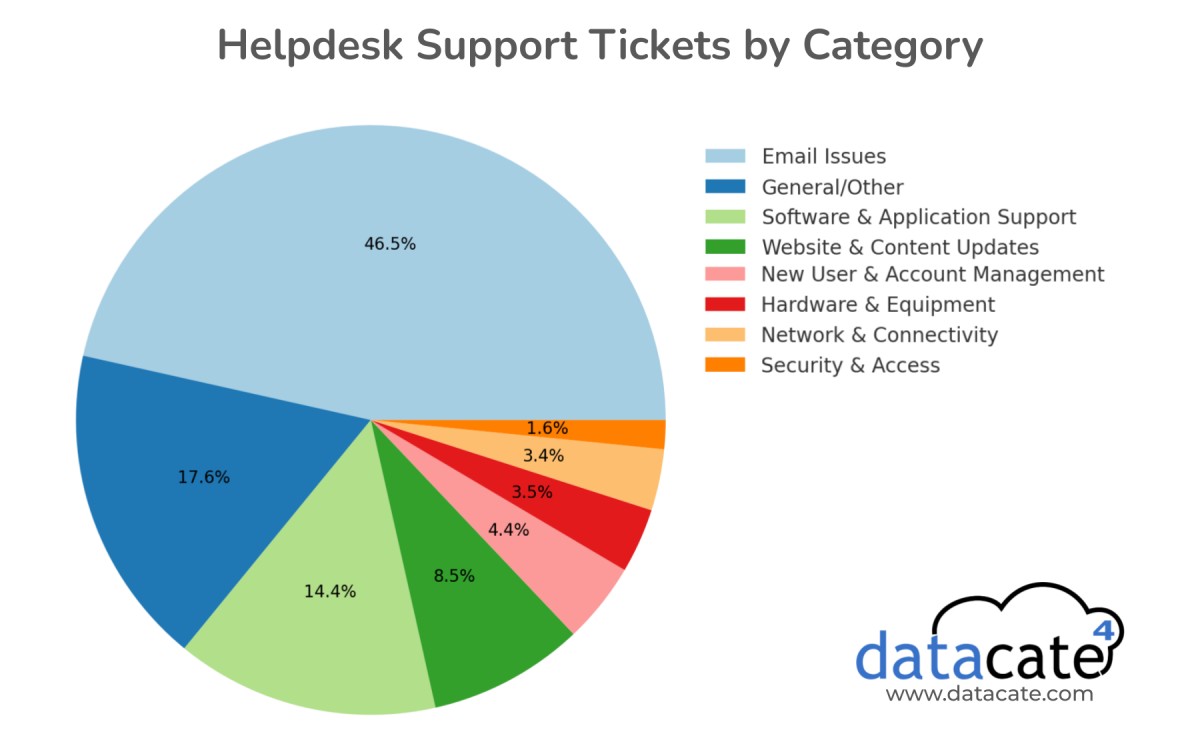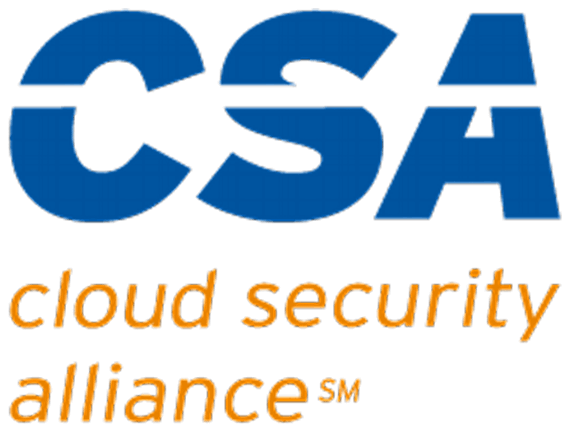With business technology’s critical role in daily operations, IT support is the backbone of modern business. At Datacate, our help desk services ensure businesses experience minimal disruptions while maximizing productivity. For this article, we analyzed last year’s support tickets to gain insights into the challenges companies face. This breakdown highlights the key issues and allows us to compare them against national benchmarks and offer actionable solutions to minimize IT-related disruptions.

Breakdown of IT Support Ticket Categories
After reviewing our latest support ticket data, we identified seven primary categories:
1. Email Issues
Issues related to email access, spam filtering, phishing scams, and compromised accounts accounted for a significant percentage of our support tickets. Email remains a critical communication tool, but it is also one of the most targeted by cyber threats.
Industry Comparison: According to a 2024 study by the Help Desk Institute, approximately 35% of all IT support tickets nationally involve email issues, making this one of the top concerns for businesses. Our internal data aligns with this trend, emphasizing the need for proactive email security solutions.
Best Practices:
- Implement multi-factor authentication (MFA) for all email accounts.
- Regularly train employees on how to recognize phishing attempts.
- Use advanced spam filters to minimize malicious email threats.
2. Software & Application Support
This category includes installation and update requests, troubleshooting software errors, and issues with business-critical applications.
Industry Comparison: Gartner research indicates that 30-40% of IT help desk tickets relate to software and application support, as businesses increasingly rely on digital tools for their operations.
Best Practices:
- Ensure all software applications are regularly updated to their latest versions.
- Standardize software across departments to reduce compatibility issues.
- Train employees on proper software usage to minimize user-related errors.
3. Website & Content Updates
Requests for updating website content, fixing broken links, or troubleshooting website performance issues fall under this category. While this is not a major ticket driver, it remains essential for maintaining a business’s online presence.
Industry Comparison: Most MSPs report 5-10% of tickets involve website support, making it a relatively minor but still necessary service.
Best Practices:
- Assign a dedicated team to manage and update website content.
- Implement a content management system (CMS) that allows for easier updates.
- Regularly audit the website for broken links and security vulnerabilities.
4. Hardware & Equipment Issues
These tickets include malfunctioning workstations, docking station failures, and hardware setup requests. With the increasing use of hybrid work environments, businesses need reliable hardware support.
Industry Comparison: A 2023 study by HDI found that 20% of all IT support tickets involve hardware failures or malfunctions. This aligns closely with our internal data.
Best Practices:
- Perform regular maintenance checks on critical hardware.
- Provide employees with troubleshooting guides for common hardware issues.
- Have backup hardware available to minimize downtime.
5. Network & Connectivity Problems
Network outages, Wi-Fi issues, and connectivity disruptions are common IT concerns. Businesses rely on stable network connections to support cloud-based applications and remote workforces.
Industry Comparison: Nationwide, network issues account for about 15-20% of IT tickets, highlighting their importance to business continuity.
Best Practices:
- Invest in enterprise-grade networking equipment.
- Implement redundancy plans to ensure internet uptime.
- Schedule regular network performance audits to identify weak points.
6. New User & Account Management
Creating new accounts, managing user permissions, and assisting with login credentials fall under this category. As businesses expand, efficiently onboarding new employees is crucial.
Industry Comparison: Approximately 10-15% of IT support requests nationally involve account management and user access issues.
Best Practices:
- Automate account provisioning to speed up new employee onboarding.
- Use single sign-on (SSO) solutions to reduce login issues.
- Regularly review and audit user permissions for security compliance.
7. Security & Access Concerns
Security-related tickets include password resets, multi-factor authentication issues, and access control concerns. With the rise in cyber threats, ensuring robust security measures is a priority for businesses.
Industry Comparison: Security-related tickets account for 15-25% of all IT support issues nationally, reflecting the growing need for cybersecurity vigilance.
Best Practices:
- Enforce strong password policies and regular password updates.
- Require MFA for all sensitive applications.
- Conduct regular security awareness training for employees.
How Datacate Outperforms Industry Benchmarks
By analyzing national IT support benchmarks, we see that Datacate consistently delivers high-quality support by focusing on:
- Fast Response Times: While the industry average response time for IT support is 2-4 hours, we strive to acknowledge tickets within 30 minutes or less.
- Efficient Resolution Rates: Nationally, average resolution times are 1-3 days, but our structured escalation processes allow us to resolve most tickets within 24 hours.
- Customer Satisfaction: Our client feedback consistently rates our support as exceeding expectations, a critical differentiator from generic MSP support services.
How Businesses Can Reduce IT Support Requests
Many common IT issues can be prevented with proactive strategies. Here are some steps businesses can take to minimize their reliance on help desk support:
1. Employee IT Training
Empowering employees with basic IT knowledge significantly reduces preventable support tickets.
- Conduct regular training on cybersecurity best practices.
- Teach employees how to troubleshoot minor hardware and software issues.
- Provide a self-service knowledge base for common IT concerns.
2. Invest in IT Infrastructure
Outdated hardware and software often lead to recurring support issues.
- Upgrade network equipment to ensure fast and stable connectivity.
- Implement endpoint security solutions to prevent malware and phishing attacks.
- Standardize software and ensure all devices are patched and updated regularly.
3. Implement Automated IT Solutions
Many IT problems can be resolved before they impact users through automation.
- Deploy remote monitoring and management (RMM) tools.
- Automate software updates to prevent security vulnerabilities.
- Use AI-driven ticketing systems to prioritize urgent issues.
4. Strengthen Cybersecurity Protocols
Security incidents create unnecessary support tickets and business risks.
- Require MFA for all employee accounts.
- Regularly test and improve incident response plans.
- Implement strict access controls to prevent unauthorized data access.
Conclusion
Analyzing IT support ticket trends provides invaluable insights into business IT challenges. By comparing our data to national industry benchmarks, we can see that our support needs align with broader trends while highlighting areas where we excel. By adopting best practices and proactive IT strategies, businesses can reduce the need for frequent help desk support and create a more efficient IT environment.
At Datacate, we remain committed to delivering industry-leading IT support and continuously refining our services to meet the evolving needs of our clients. If your business is looking for a proactive IT partner, contact us today to learn how we can help you streamline your technology operations.




